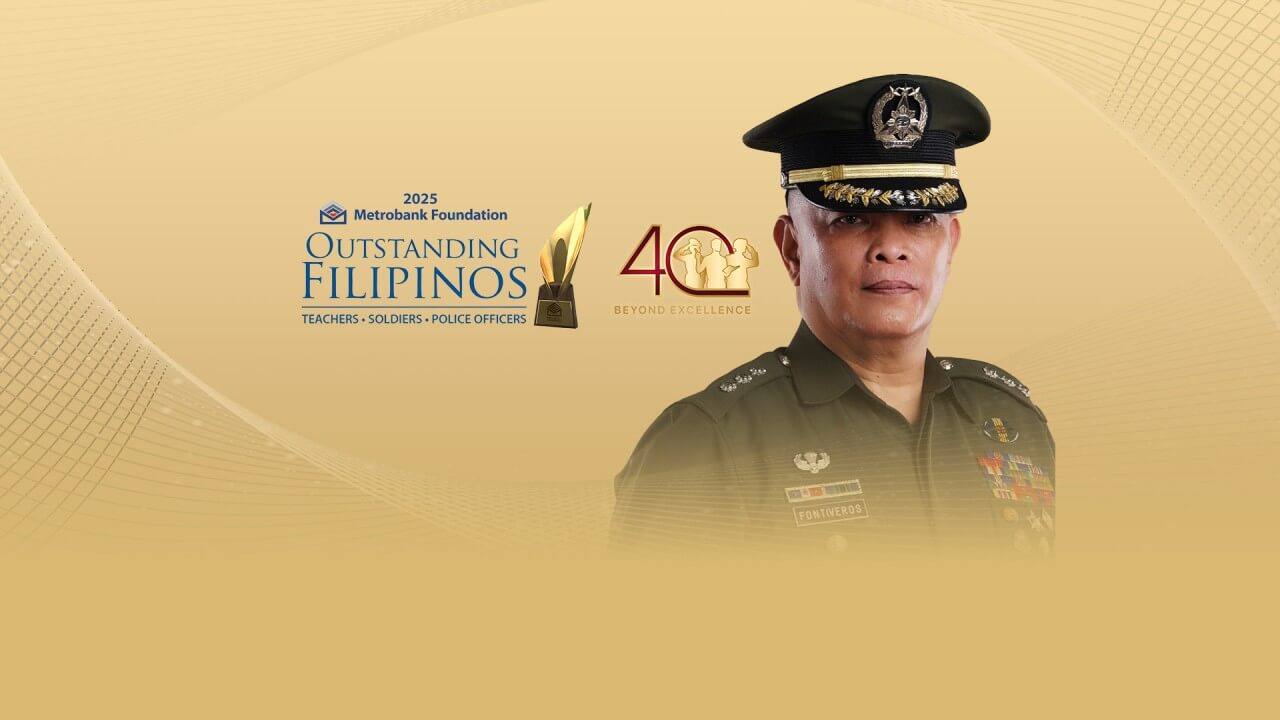

InsiderPH features the inspiring stories of Metrobank Foundation’s awardees as Outstanding Filipinos for 2025—teachers, soldiers and police officers who are making significant contributions to nation building.
The war between communist rebels and government troops played out in his periphery: sometimes in the distance, sometimes within earshot. He saw it in the abrupt silence of his parents, in neighbors leaving without farewells, in the way soldiers passed through town carrying the fatigue of too many patrols.
He grew up in a family who had little, but knew, as every skirmish made clear, that survival was not something one could count on.
“I grew up witnessing soldiers come home in body bags,” Colonel Joey T. Fontiveros recalls. “That moment marked the day I decided to become one.”
He entered the Scout Rangers, a unit built on stealth, endurance, and ferocity through skills, stamina, and spirit, and the tacit acceptance that missions often meant walking into places with no maps, where every operation might be the last.
But life’s routes are rarely straight. Col. Fontiveros found himself confined for five years in a military prison. He does not dwell on the charges; he speaks instead of the lessons. “a man can be stripped of everything but resolve,” he says.
Forging cyber warriors
Two decades later, the country fell under lockdown, the Philippine Army (PA) handed him a new mission: build its first cyber unit.
He was given very limited personnel with the integration of 50 special enlisted soldiers – recruited with the needed skills and competencies to do cyber duties. There was no doctrine. No precedent. Just a firm directive to defend a territory that could not be seen and touched, the PA Cyber Domain.
Capitalizing on the prospects of the lockdown, the unit navigated to improve its capability by natively developing critical systems while physically transforming to have a decent abode and workplace for the cyber warriors.
“Cyberspace makes you doubt whether to continue the journey or not,” he says. “But I decided to press on.”
At the time, the Army’s corridors were more fluent in calibers than in codes. Cybersecurity, if it registered at all, was considered auxiliary – a problem for signal people only, not for men with decades in the field. Col. Fontiveros thought otherwise.
Blueprints of survival
He began with nothing on the page. He drafted the structure, defined the mission, established the vision, mapped the gaps, and rallied the strategy. He argued, sometimes to skeptical ears, that cyber defense was not ornamental but central to national security.
When funds ran dry, he improvised. He built systems out of open-source tools, reverse-engineered what could be adapted and, crucially, learned from lower-ranking privates whose technical skills exceeded his own.
“You must also be willing to listen,” he says. “To sit beside the private who knows more than you do and learn.”
In a military profession that lives on hierarchy, this is not an instinct that comes naturally. For Col. Fontiveros, it was a continuation of an older discipline, one grounded in survival rather than rank.
Under his watch, he led the Army Cyber Battalion in the development of various systems that revolutionized the operations of different Philippine Army units and offices and strengthened the cybersecurity operations of the unit and the PA.
Humility as strength
He launched cyber hygiene activities, literacy sessions for troops on the front lines, and public campaigns against online scams.
One project called the “Message of Cyber Ranger to Filipino Hackers” drew more than two million views on Facebook, a civilian arena that had become, in its own way, a contested space.
“I started from scratch,” he says. “I never saw myself as better than anyone. My only goal was to learn and move forward.”
This is not performance. Humility, for him, is deliberate, the product of a history he does not sanitize. He knows the long echo of disgrace. During his confinement in the early 2000s, he planted vegetables, raised chickens, and rigged a Wi-Fi connection so he could finish his Master’s in Public Management through the UP Open University.
“The bitterness–I got rid of the ‘i’ in it,” he once wrote, “and replaced it with an ‘e.’ So I became better.”
He credits his wife, Winda, with his return. She left the service to raise their three sons while he served time. “I wasn’t able to fulfill my roles as a husband and father,” he says. “And yet she stood strong. Her resilience became my greatest source of strength.”
The digital frontline
Now, at the helm of the AFP’s cyber operations, he commands over a different kind of battlefield. This year, the Army staged CYBEX 2024, a joint cyber exercise facilitated by the Department of National Defense, at Camp Aguinaldo.
Soldiers ran live simulations of ransomware mitigation, data breach response, and national-level cyber defense scenarios. The terrain had shifted; the stakes had not.
“Recognition has never been the end goal,” he says. “I always tell my team: work with excellence, not for reward.”
Coming from a man who has touched bottom, served his penance, and built again from zero, it does not sound like rhetoric. It sounds like a soldier’s simple truth. —Metrobank Foundation